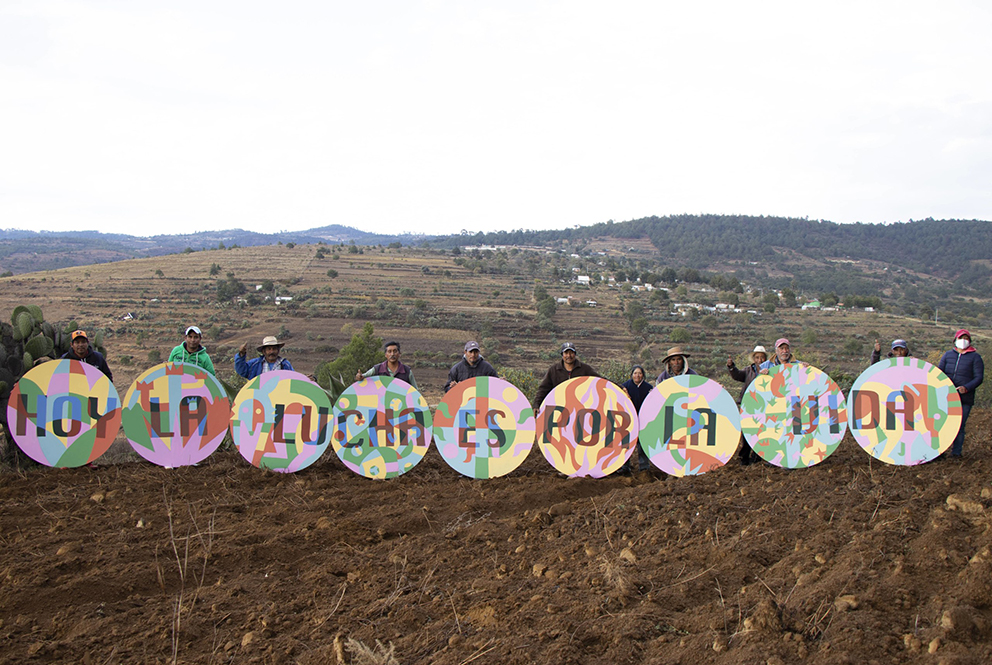Mexican Supreme Court cancels mining concessions, but fails to review Mining Law
25 febrero, 2022

While the court’s sentence is a victory for Indigenous towns and communities in México that are struggling against mining, it left the Mining Law in tact, which means that communities like Tecoltemi have to continue carrying out long legal processes in order to defend their land
Text by Alejandro Ruiz, originally published February 17, 2022.
Photo: Courtesy.
QUERÉTARO—On Wednesday, February 16, the First Chamber of Mexico’s Supreme Court of Justice (SCJN) cancelled the mining concessions in the Nahua community of Tecotelmi, Puebla. The court’s decision creates an important precedent for the struggles that hundreds of communities in the country are waging against open pit mining in their territories.
The SCJN’s ruling stems from a writ of protection filed by the community against the Secretary of the Economy, Mexico’s national congress, and the President of the Republic seven years ago, after they granted a concession to Minera Gorrión, a subsidiary of Canada’s Almaden Minerals.
The community, together with members of the Project on Organization, Development, Education and Research (PODER), argued that these branches of the federal government violated international norms by failing to seek the free, prior and informed consent of the people of Tecotelmi, as stipulated in the International Labor Organization’s Convention 169.
The plaintiffs also demanded that the Mining Law be declared unconstitutional, since it does not include this international norm; in contradicting the principle of international conventions. The Mining Law, however, was left out of the sentence that Magistrate Jorge Mario Pardo Rebolledo wrote, and it continues to be in force in the country, even though it does not require consultation with Indigenous communities.
The discussion of the writ of protection was scheduled to happen months ago, but the First Chamber of the Supreme Court had postponed it on numerous occasions.
A historic ruling, a long road ahead
Though the Court’s ruling cancels the mining concessions in Tecotelmi, one of the key points the community was demanding was the revision of the Mining Law, which they say goes against the rights of Indigenous communities in México.
A su vez, las resoluciones de la Corte en esta materia han dado razón al argumento de la defensa legal de la comunidad. Un ejemplo es la sentencia que, semanas atrás, emitió el juzgado sexto de Distrito de la SCJN, ubicado en Uruapan, Michoacán; donde resolvieron un amparo en favor de la comunidad de Huitzontla.
Recent Supreme Court rulings align with community arguments using the legal system to defend their territory. An example of this is the sentence that, a few weks ago, the Seventh District Magistrate of the SCJN, located in Uruapan, Michoacán, wrote in favor of a writ of protection advanced by the community of Huizontla.
But in Pardo Rebolledo’s ruling (which was fully accepted by four of five magistrates), a discussion about the unconstitutionality of the Mining Law wasn’t included.
In a comminqué, the Center for Analysis and Research (FUNDAR) declared that the criteria of the court is contradictory: even though the SCJN recognizes that not consulting Indigenous communities is a violation of human rights, it argues that “the Mining Law isn’t directly related to the interests and rights of Indigenous people.”
In that sense, FUNDAR stated that the SCJN “lost the opportunity to more carefully examine a law that, in giving preference to mining activities, violates Indigenous communities’ right to land and territory, as well as the right to property in ejidos (communal landholdings).”
Because of this, even though the ruling is a step towards the reformulation of the Mining Law and the protection of the rights of Indigenous communities in the country, current legislation is still intact. That means that in order to defend their collective rights, Indigenous peoples must still wait years for a ruling in their favor as their territory suffers the consequences of mining.
Click here to sign up for Pie de Página’s bi-weekly English newsletter.
Ayúdanos a sostener un periodismo ético y responsable, que sirva para construir mejores sociedades. Patrocina una historia y forma parte de nuestra comunidad.
Dona













